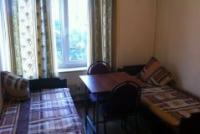Rules for renting out a room and share in an apartment under a lease agreement: is the consent of neighbors required? How to rent residential premises in a dormitory? How to rent out a dorm room correctly
Renting out living space is often associated with a number of difficulties, which every landlord needs to know. One of the important issues is quickly finding reliable tenants. We have prepared detailed instructions for you on how to quickly find tenants, complying with the law and without losing benefits.
○ Who has the right to rent out an apartment or room.
According to Russian legislation, only the owner can rent out living space in the first place.
- “The right to lease property belongs to its owner. Lessors can also be persons authorized by law or the owner to rent out property (Article 608 of the Civil Code of the Russian Federation).”
Thus, the law does not prohibit the right to act as a landlord to third parties, provided that they have a notarized power of attorney from the owner of the property.
If the property is assigned to several owners, it is necessary to obtain written permission for real estate transactions from each of them, certified by a notary. Their personal presence at the conclusion of a transaction without written consent is also allowed.
When planning to rent out an apartment/room, the owner must also obtain consent from all persons registered in the living space.
○ How to submit: individual entrepreneur or individual.
Obtaining the status of an individual entrepreneur is not mandatory for a future landlord. You can rent out living space as an individual, paying the appropriate amount of tax.
The decision on the need to register an individual entrepreneur depends on how profitable it is. The advantage of this status is only the ability to choose a taxation option, while for an individual there is only one option - 13% of personal income tax. However, registering an individual entrepreneur has a number of disadvantages:
- The need to pay insurance premiums, draw up regular reports on them and liability for violation of the order.
- Responsibility for keeping records of expenses and income.
- If the living space is sold, the income from the transaction will not be exempt from taxation, whereas for individuals there is a similar opportunity if the property has been owned for more than 3 years.
Thus, maintaining the status of an individual simplifies the procedure for renting out living space. However, the income tax is higher than for individual entrepreneurs. Therefore, the issue of deciding the status of a landlord is decided on an individual basis, based on individual preferences.
○ Preparation for delivery.
To prepare an apartment/room for rent you need:
- Get your housing documents in order.
- Pay off utility debts.
- Prepare rooms (make cosmetic repairs if necessary).
- Check the plumbing and repair it if necessary.
- Do some general cleaning.
- Remove particularly valuable and memorable items from the apartment.
- Place furniture and household appliances.
Properly prepared housing increases the cost of rent by about 50% and greatly simplifies the search for tenants, so it is important to pay attention to preparatory measures.
○ How to find tenants.
Finding a tenant is an important stage of rental actions, because the stability of income and the absence of problems with living space depend on his reliability. You can find a tenant through an intermediary or on your own.
✔ Agencies.
You should contact the services of realtors if you do not want to waste time searching for tenants and checking their reliability or are not confident in your abilities. At the same time, it is important to choose the right agency, because the number of scammers among realtors is steadily growing. When making a choice, pay attention to:
- Time spent on the real estate market.
- Percentage of successful transactions.
- Customer reviews.
- Professionalism of the employees.
It should be borne in mind that the services of realtors are paid, but a percentage of the concluded transaction is usually paid to them by the tenant.
✔ Advertisements.
This is one of the ways to independently find a tenant. You can advertise in print media and television, in special sections. The placement fee is small, and the effect is quite fast. In this case, checking the reliability of a potential tenant falls on the shoulders of the landlord.
✔ Internet.
Another way to quickly find an employer without involving intermediaries. You can submit an ad on popular sites www.avito.ru, www.irru.ru, www.domofond.ru, etc. It is also worth posting information about finding a tenant and the requirements for him on your personal pages on social networks. This is a free, but quite effective way to find a tenant fairly quickly.
✔ Personal contacts.
You can often find people willing to rent an apartment among personal acquaintances. In this case, you will not spend money on checking the tenant and will be sure of the permanent registration address. However, this delivery option also has disadvantages. We cannot exclude the risk that, taking advantage of the acquaintance, the employer will delay the rent or even ask to reduce it. In such a case, not everyone can refuse a request to their detriment, so it is worth taking into account the possibility of such a development of events when deciding whether to rent out housing to friends or not.
○ Study of tenants.
When planning to rent out your living space to strangers, it is worth conducting at least a minimal check of their identity. You can do this as follows:
- Ask to confirm your income using a 2-NDFL certificate or show documents for a car or other property.
- Check the submitted passport against any publicly available database (for example, http://services.fms.gov.ru/).
- Check for credit debts on the bailiffs website (http://www.fssprus.ru/iss/ip/).
Here it should be borne in mind that by law, the employer is obliged to provide only a passport; he can demonstrate all other documents solely at his own request. Therefore, the landlord cannot demand this, but he may be wary if such a request is refused.
○ We rent with or without a contract.
The conclusion of a lease transaction can take place by oral agreement or written agreement. In the first case, the parties must be prepared for the fact that the terms of the contract may not be observed by the counterparty, and he will not have responsibility for this. Therefore, it is advisable to rent out living space under a contract in order to be sure that your rights are respected. You can prepare the document yourself or use the services of a notary. It is important to take into account that if the tenant is an individual, then a rental agreement for residential premises will be drawn up. And if the apartment will be used by a legal entity, you need to prepare a lease agreement.
- "1. Under a residential lease agreement, one party - the owner of the residential premises or a person authorized by him (lessor) - undertakes to provide the other party (tenant) with residential premises for a fee for possession and use for living in it.
- 2. Legal entities may be provided with residential premises for possession and (or) use on the basis of a lease or other agreement. A legal entity may use residential premises only for the residence of citizens (Article 671 of the Civil Code of the Russian Federation).”
○ Conclusion of an agreement and signing of documents.
The document must contain all the necessary points of a simple contract:
- Information about the parties to the transaction.
- Description of the subject of the contract.
- Rental period.
- Rent price.
- Rights and obligations of the parties.
- Responsibility for failure to fulfill one's obligations.
- Possibility of force majeure circumstances.
- Additional conditions (possibility of carrying out repairs on account of rent, sublease, etc.).
- Details and signatures.
It is also necessary to take into account all the risks: the possibility of increasing the rent, a fine for early termination of the contract, etc.
It is worth considering that the more details are reflected in the contract, the higher the guarantee of protection of the rights of the parties to the transaction.
In addition to the agreement, the parties to the transaction must sign:
- An act of acceptance and transfer of property, which reflects the actual condition of the living space, and also records the readings of all meters at the time of conclusion of the agreement.
- An inventory of property, which details what items and in what quantities are transferred to the tenant for temporary use.
○ Registration of the agreement.
A lease agreement is not subject to state registration, regardless of its validity period. As for the lease agreement, it must be registered with Rosreestr or the MFC branch if it is concluded for a period of more than 1 year.
- 1. “A lease agreement for a period of more than a year, and if at least one of the parties to the agreement is a legal entity, regardless of the term, must be concluded in writing.
- 2. A real estate lease agreement is subject to state registration, unless otherwise provided by law.
- 3. A property lease agreement, providing for the subsequent transfer of ownership of this property to the lessee (Article 624), is concluded in the form provided for the purchase and sale agreement of such property (Article 609 of the Civil Code of the Russian Federation).”
To register you need:
- Pay the state duty in the prescribed amount (10,000 rubles for individuals and 15,000 rubles for legal entities). Payment is made by each participant in an equal share, or the responsibility is assigned to one of the parties (this point must be specified in the contract).
- Write an application on behalf of one of the parties to the transaction, attaching the notarized consent of other owners or registered persons to conclude a lease agreement.
○ How to charge.
The method of transferring payment for accommodation is discussed by the parties. The calculation can be:
- Cash (in this case, you must draw up and sign a receipt for the transfer of funds each time).
- Non-cash (transfer will be confirmed by bank statements).
Payment can be made:
- Every month.
- Once a quarter.
- One time per year.
The law does not provide for a mandatory form of rent payment and its frequency.
○ Tax payment and accounting.
According to the law, renting out housing requires paying taxes in the prescribed amount.
- “Taxpayers - individuals for taxes paid on the basis of tax notices, in addition to the obligations provided for in paragraph 1 of this article, are required to report the presence of real estate and (or) vehicles recognized as objects of taxation for the relevant taxes to the tax authority for their choice in the event of non-receipt of tax notices and non-payment of taxes in relation to the specified objects of taxation for the period of their ownership (Clause 2.1 of Article 23 of the Tax Code of the Russian Federation).”
If we are talking about an individual, his tax on rental income is:
- 13% for residents of the country.
- 30% for foreign citizens.
By registering the status of an individual entrepreneur, the landlord can pay taxes in the amount of 6% of income by choosing a simplified taxation system. At the same time, he must maintain accounting records and record income and expenses.
○ Responsibility when renting out an apartment.
If it is discovered that the landlord does not pay taxes on rental income, he may be subject to a fine of 20% to 40% in addition to recovery of the amount withheld.
- “Non-payment or incomplete payment of tax amounts (fees, insurance contributions) as a result of understatement of the tax base (base for calculating insurance premiums), other incorrect calculation of taxes (fees, insurance contributions) or other unlawful actions (inaction), if such an act does not contain signs tax offenses provided for in Articles 129.3 and 129.5 of this Code entail a fine in the amount of 20 percent of the unpaid amount of tax (fees, insurance contributions) (clause 1 of Article 122 of the Tax Code of the Russian Federation).
- Acts provided for in paragraph 1 of this article, committed intentionally, entail a fine in the amount of 40 percent of the unpaid amount of tax (fee, insurance premiums) (clause 3 of article 122 of the Tax Code of the Russian Federation).”
If the amount of non-payment is recognized as particularly large, the punishment is regulated by the Criminal Code of the Russian Federation and provides for a fine or imprisonment.
- “Evasion of taxes and (or) fees from an individual by failure to submit a tax return or other documents, the submission of which is mandatory in accordance with the legislation of the Russian Federation on taxes and fees, or by including in a tax return or such documents knowingly false information, committed on a large scale, is punishable by a fine in the amount of one hundred thousand to three hundred thousand rubles, or in the amount of the wages or other income of the convicted person for a period of one to two years, or by forced labor for a term of up to one year, or by arrest for a term of up to six months. , or imprisonment for a term of up to one year.”
Here you need to take into account that a large amount is considered to be an amount greater than 900,000 rubles, when the amount of the unpaid tax debt is 10% of the specified amount.
In one of our articles we talked about the features. But the rental housing market is not limited to apartments. And if you want to officially rent out your room, then this article is especially for you.
The rooms are different
We invite you to consider the different categories of rooms to highlight the features of renting them out:
- Rooms in privatized apartments;
- Rooms in non-privatized apartments;
- Privatized rooms in communal apartments;
- Non-privatized rooms in communal apartments.
Non-privatized room in a communal apartment
Let's start with the room whose rental requires the greatest number of approvals.
Non-privatized the room is not your property. But according to pp. 2 clause 1 art. 67 Housing Code of the Russian Federation, you have the right to rent out your residential premises in sublease. However, according to Clause 1 of Article 685 of the Civil Code of the Russian Federation You can rent out residential premises under a sublease agreement only with the consent of the lessor.
The lessor of a non-privatized room may be different: prefecture, municipality or other authority . You can find the answer to the question of who your employer is in rental agreement, on the basis of which you yourself live in your room.
The landlord should submit a written request for permission to enter into sublease agreements. This application must also contain the consent of all members of your family living with you.
But let's not forget about your flatmates. In accordance with clause 2 art. 76 Residential Complex of the Russian Federation, for the sublease of residential premises located in a communal apartment, it is also required consent of all tenants and residents living together with them members of their families, all owners and members of their families living with them. That is, the written consent of all neighbors should be attached to the application to the tenant.
If a positive response is received from the lessor (and such a response must also be provided in writing), a sublease agreement can be concluded.
Privatized room in a communal apartment
The privatized room is your property. The right to dispose of one’s property is enshrined in legislation ( clause 2 art. 35 of the Constitution of the Russian Federation, paragraph 2 of Art. 209 Civil Code of the Russian Federation). It would seem that there is no need to coordinate anything with anyone here. But that's not true.
In a communal apartment there are also places that do not belong only to you: a corridor, a kitchen, a bathroom. They are the common property of all residents. According to Art. 246 Civil Code of the Russian Federation the disposal of property in shared ownership is carried out by agreement of all its participants. Therefore, before concluding a rental agreement, you should still obtain the consent of your neighbors, and in writing.
Regardless of whether the room is privatized or not, the tenant will interact with your neighbors in one way or another.
This way you can avoid conflicts with neighbors both for the employer and for yourself.
Room in a non-privatized apartment
To rent out a room in your non-privatized apartment, you no longer need the consent of your neighbors, since there are simply no neighbors in the apartment.
However, just as in the case of other non-privatized housing, it will be necessary landlord's consent. The procedure for obtaining consent is the same: you need a written application accompanied by the consent of your family members living with you.
Room in a privatized apartment
And finally, let's move on to the simplest (in terms of coordination) case. If you are sole owner apartment in which you are going to rent out a room, then Absolutely no one's consent is required to enter into a rental agreement.
But if there are other owners along with you, then their consent will be necessary. Such consent can be obtained in the following ways:
- Execute a power of attorney for one of the owners stating that the others trust him to conclude a rental agreement, in which case one of the owners will act as the lessor under the agreement;
- In the contract, indicate all owners as lessors.
We talked about neighbors in communal apartments. Here we remind you that if you rent a room in a private apartment, you yourself will be neighbors with tenants. Therefore, we advise you to determine in advance the procedure for using the premises that you do not rent directly to the tenant, but which he will also use: hallway, corridor, bathroom, etc.
If you responsibly approach the coordination of these points, this will allow you to avoid many disagreements during the tenant’s stay in your apartment.
As for all the rooms
Notification to the curious: in relationships with neighbors
Above we described what and in what cases it is necessary to obtain the consent of neighbors. Please note that you are not required to provide them with information directly about the rental conditions themselves.
Who lives in your room and for what fee is entirely your business. This applies to both neighbors in a communal apartment and neighbors in the hallway.
If you have a trusting relationship with your neighbors, you can ask them to “keep an eye” on your room and inform you in case of any problems or conflicts. But all this is within reason, without interference in the private life of the employer and espionage.
HOAs and cooperatives
Who else might be interested in your rental business? Currently, both owners and tenants of municipal housing interact quite closely with homeowners' associations and cooperatives.
Usually, the relationship between an adequate resident and the responsible representative of the HOA/cooperative develops normally. But as with neighbors, you are not required to provide any information about your employers.
The only exception: if the cost of any utilities is calculated based on the number of people living in the apartment/room, you must indicate the number of your tenants. But you have no obligation to provide their information.
Moreover, let's not forget about Federal Law of the Russian Federation of July 27, 2006 No. 152-FZ “On Personal Data”, from which we can conclude that you do not have the right to provide anyone with information about your employers.
If you maintain a trusting relationship with your HOA/cooperative, we can advise you to notify them that you are renting a room, leave a contact phone number and ask them to contact you immediately in case of any conflict situations.
Property in a rented room
Most likely, the room you want to rent out contains your property: furniture, plumbing, chandeliers, and so on. We are confident that you are interested in preserving this property while the tenants are in the room.
To reduce the risk of damage to this property and obtain guarantees of compensation if damage does occur, you can register acceptance certificate property. Such an act will be an annex to the rental agreement.
The deed should list all property, if possible so that it can be easily identified: what kind of TV, wardrobe, and so on. If the property already has some damage, then this fact is also reflected in the act - but this, most likely, will already be a requirement of your employer.
Public utilities
We have already drawn your attention to the fact that if the cost of any utility services depends on the number of people living in the apartment/room, then it is necessary to notify the organization that calculates these utility bills. This could be either a homeowners association/cooperative, or the company itself providing the services.
As for public services in general, in accordance with Art. 678 Civil Code of the Russian Federation, the employer must pay for them. In the contract, this obligation can be assigned to you as well - it all depends on the agreements reached. However, we draw your attention to the fact that even if the obligation to pay for utilities is assigned to the tenant, claims for non-payment will be brought against you, since under the agreement with the company providing the services, you continue to bear the obligations.
Scout the situation
Most people take good care of their property. And the desire to keep everything under control in this case is absolutely normal.
These formalities are necessary due to the fact that the tenant officially living in the room acquires the right to inviolability of home. This right is guaranteed to us all Constitution And Housing Code. Therefore, if you simply come without asking, especially in the absence of the employer, this most likely “will not make him happy.”
Results and conclusions
In conclusion, we offer you several questions, the answers to which will help you determine what and with whom you need to agree before renting out a room, and what to pay attention to when drawing up a contract:
- Is your room in a communal or private apartment?
- What is your relationship with your neighbors?
- Who manages the common property of the house - HOA/cooperative?
- How are utility bills calculated?
- What property is in the room?
As seen, renting a room is a slightly more complex undertaking than renting an apartment. The difficulty, in our opinion, is that additional factors of human relationships appear: neighbors in a communal apartment and living together with a tenant in different rooms of the same apartment. But in any case, you can avoid many problems and conflicts if you take a responsible approach to the issues of coordinating and drawing up a rental agreement.
If you decide to rent out a room in a communal apartment, the procedure for completing this transaction will be different depending on whether this room is your property or you are renting it from the municipality under a social tenancy agreement. In the event that this room is purchased or privatized by you, it is your private property and you are free to dispose of it as you wish.Judicial practice is such that the requirement of Article 246 of the Civil Code on the need for written consent for the disposal of owned property has been recognized as contrary to the Constitution. Now it is not required to receive it from other residents living in a communal apartment. So that the tenant does not subsequently have disputes with neighbors regarding the use of places that are in shared ownership, it is better for you to conclude an appropriate agreement with them on the use of common shared property. The document can be drawn up by mutual agreement or by court decision.
When you want to rent out a non-privatized room, your desire is also not contrary to the law, but in this case you need to obtain the consent of not only all neighbors, but also the landlord, which is the prefecture, municipality or even an enterprise if this room is your official housing. You can find out who the landlord is in your case in the text of the social tenancy agreement. Send a written application to the landlord requesting permission to conclude a sublease agreement. It must be accompanied by the written consent of all members of your family living with you.
Registration of the contract
The only form of contractual relations in the case of a transaction between individuals is a rental agreement. The lease agreement is concluded only with a legal entity. If you are renting out a room with furniture and other property that belongs to you, draw up an act of acceptance and transfer as an appendix to the rental agreement. When listing, provide a brief description of the property so it can be identified. Existing defects and damage should also be reflected in the description. It would not hurt to include in the contract a condition under which you will have the right to periodically visit the premises in order to check compliance with the terms of use.Income received from renting should be reflected in your income tax return. On this amount you are required to pay personal income tax in the amount of 13%. And keep in mind that if the rental agreement is concluded for a period of more than a year, it must be registered with the Rosreestr authorities.
Most often, family hostels are used by those who come to work with their family. To make it easier for you to find an apartment, as well as save money, renting a room in a family hostel in Moscow would be an excellent solution.
Also, this type of accommodation is suitable for those who have already created seven in Moscow and cannot live in a separate dormitory themselves. Of course, in this case, you need to think about renting an apartment or buying your own home. But such a way out of the situation is not always possible due to various circumstances.
Our hostel offers comfortable rooms for a family, even with a child. We will provide you with all the necessary furniture and equipment for your comfortable and cozy stay.
A family dormitory is essentially the same as a hostel, but only members of your family will live in one room. We can also choose to provide accommodation in several rooms, for example, in one for the parents and in the other for the child.
Price list for rooms in the VDNH Hotel:
This category of hostels provides comfortable living conditions for the whole family in the capital at minimal cost. Of course, your own apartment is the best option, but in a situation where the budget does not allow you to rent or buy one, living in a family hostel will help you out a lot.

Why should you choose our hostel?
Firstly, we want to help you and have created the most comfortable conditions at affordable prices. And secondly, we have an excellent location; there is a metro station nearby, from which you can get to anywhere in the city.

The main advantages of living with us:
- individual bathroom for each room;
- availability of all necessary furniture;
- presence of a refrigerator and TV;
- bed dress;
- high-quality European renovation;
- reliable door locks.
We also provide room cleaning every day and bed linen is changed once a week. Since you have decided to live in the capital in a family hostel, we will be happy to provide you with this opportunity at an affordable price.
Leave your phone number and we will contact you within 15 minutes!






